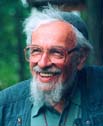Section |
Spiritual Innovators Zalman Schachter-Shalomi. |
 |

Back to Index
|
 Back to Index |
|
||||||
| Introductory Notes - Jock McTavish | ||||||
| Rabbi Zalman Schachter-Shalomi holds the World Wisdom Chair at The Naropa
Institute. In 1989 he founded the trans-denominational Spiritual Eldering
Institute and is professor emeritus at Temple University. An eminent rabbi
and professor, he is a major figure in the Jewish spiritual renewal movement.
He is the author of over 150 articles and monographs on Jewish spiritual
life and has translated many Hassidic and Kabbalistic texts. His most recent
books include Spiritual Intimacy, Gate To the Heart, Spiritual Elder and
From Age-ing To Sage-ing. Reb Zalman is an energy that was introduced to me first in Rodger Kamenetz's "Stalking Elijah - Adventures with Today's Jewish Mystical Masters". This remarkable book came about because Rodger was one of a number of Jews invited to Dharamsala, India in 1990 at the request of the Delai Lama to advise him on the issues of maintaining one's culture and religion while in exile. But in considering the Delai Lama's question, he found his own need to ground himself spiritually. Kamenetz began a pilgrimage of searching for these answers across his own United States, and did in fact return in 1996. Of course Reb Zalman was also in Dharamsala. So it is interesting that Kramenetz began the search for his own spiritual path there with the counsel of Reb Zalman. The Meditation on the Name of God we considered in the early part of this course was given to Rodger by Reb Zalman at JFK between airplanes on the way home from India. It is an exquisite example of Reb Zalman's work. In this meditation he has embraced a most ancient Jewish tradition, added a broad inter-spiritual mysticism, and created a tool of insight most suitable to the modern soul. Let's take a review of that meditation. Reb Zalman was born in Poland and as a teenager escaped Holocaust by internment in a French camp. His family came to the US in 1940 and he was ordained a Rabbi in 1947. He was professor and department head of Jewish Studies at the University of Manitoba in the mid 50's. He got into trouble with the orthodox establishment in the '60's because he felt the drug experimentation was a spiritual searching. He was one of a few that realized the Kabbala provided a connection to this modern searching. He found the mystery and practice of Kabbala was alive and well in the ultra-conservative Jewish community of Hassidim. The Kabbala is a topic simply not able to be made sense of on a first introduction. It is a great complexity and a living mythos whose elements are the deepest sort of archtypes, yet whose entire vocabulary is unfamiliar. To the general modern mind it will appear superstitious and irrelevant. It is neither of these. Respect and understanding begin to grow only after many months. If your interests are to pursue the mystical aspects of the spiritual equation, and further study the light other's have seen, you will want to learn about "sparks of light" and the "10 holy sefirot". Reb Zalman's new work began then to integrate feminism, ecology, egalitarianism and progressive politics - a mix that became the Jewish Renewal Movement. Kamenetz again: "Reb Zalman helped inhibited, frozen Jews warm up their hearts. In one powerful exercise, I recited a psalm line by line, back and forth with a partner, addressing the words addressed to God to the You sitting in front of me. The words gained a tremendous presence and depth they'd never found for me in a group recitation. By the end of the psalm, our eyes were brimming with tears."The themes of the 75 Innovators are most well represented by Zalman Schachter-Shalomi. Let's close with his words on revelation and tradition. "Trying to give finite form to the Revelation of the Infinite is dangerous. You can't drive forward while looking through the rear-view mirror. The Revelation of Torah, for example, has no one single finite form. The Revelation might remain the same, but the form which mortals give it changes. Tradition, therefore, is a marker we leave behind us in previous life cycles so that when we come back we have some notion of where we left off. We need to look at tradition, therefore, not as a relic of the past but as a catalyst for the future." |
||||||
| Clicking the icon left will activate the e-mail on your machine and direct your comments to us. Comments are welcome and will be posted with usual editorial courtesies. | |
St. David's United Church.Calgary, Alberta, Canada.
The United Church of Canada.
November 24, 2002